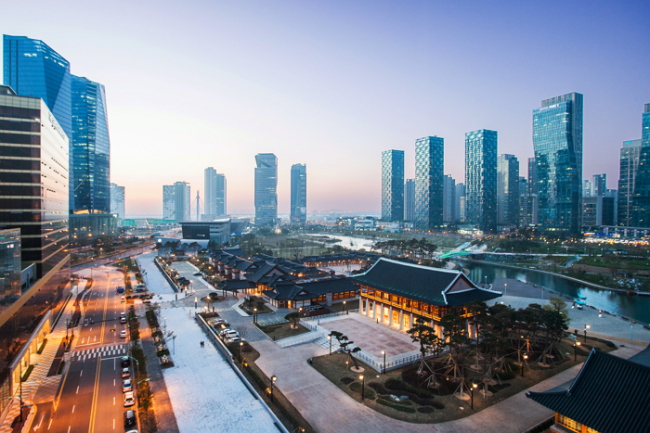Hotels seem to be the best business in Korea to be in right now.
Tourism is booming in Korea with a record number of visitors ― of which the Chinese take up nearly half.
Last year’s historic milestone of 14 million foreign visitors looks set to be broken this year, as the travel-loving Chinese continue to throng Seoul streets.
New hotels are rising in Seoul. Jejudo Island ― once a favorite destination for Korean newlyweds ― has turned into a giant resort development site, as Chinese vacationers surge in. Gangwon Province’s Pyeongchang is expanding its hospitality infrastructure for the 2018 Winter Olympics, while Gwangju is seeking to become an Asian cultural hub following the opening of the 2015 Universiade.
A look underneath the glittering surface, however, reveals an industry that is faced with unprecedented challenges, brought on by technology, a shift in tourist demographics and diversifying customer demand.
 |
A view of the newly opened Gyeongwonjae Ambassador hanok hotel in Songdo, Incheon (Grand Ambassador Seoul) |
“Four- to five-star hotels have been suffering a decline in room occupancy, following the drop in Japanese tourists,” said Kim Jang-won, an official at the Korea Tourism Organization.
“On the contrary, cheap motel rooms are selling well, thanks to Chinese tourists.”
The Chinese, who have overtaken the Japanese in arrivals to Korea, tend to skimp on accommodation, while splurging on shopping, he explained.
Luxury hotels, stung by a drop in room occupancy from over 90 percent until 2012 to 74 percent in 2014, are trying to rev up revenues through banquet sales, hosting weddings, baby’s first birthday parties and business meetings. Weddings, in particular, are seen by many hoteliers as an opportunity to create a loyal customer base.
“Hotels are more than a place for accommodation. They make your special day even more special,” said Hannah Jeon, public relations coordinator at Conrad Seoul.
In a trend dubbed “the rise of the un-hotel” in Europe and the U.S., unorthodox accommodation services are sprouting up in Korea as well, evidenced by the 2013 arrival here of the global accommodation sharing service provider AirBnB.
Matching spare rooms at homes of local residents and tourists looking for low-cost, out-of-the-box lodging experience, the service is expanding fast with 6,400 room offerings now.
As more travelers seek accommodation options on the Internet and smartphones, reservation applications such as Hotel Now and Hotels Combined have emerged, offering information on available rooms of hotels or private apartments and houses at discount prices.
“Smartphones led to growing demand for mobile apps that enabled users to check availability of rooms and spontaneously make reservations,” said Kim Ka-young, cofounder of IT start-up Bonbonlab, the developer of Hotel Now.
While these niche mobile apps have been complementary ― rather than disruptive ― to traditional lodging services, major brands are also trying to cater to the diversifying needs of guests, as many now want a new lodging experience on top of convenience and quality services.
Blending a taste of local culture with the convenience of Western hospitality, hotels set in hanoks (traditional Korean homes) are emerging, adding more color to this increasingly diversifying hotel scene in Korea.
By Park Hyong-ki (
hkp@heraldcorp.com)








